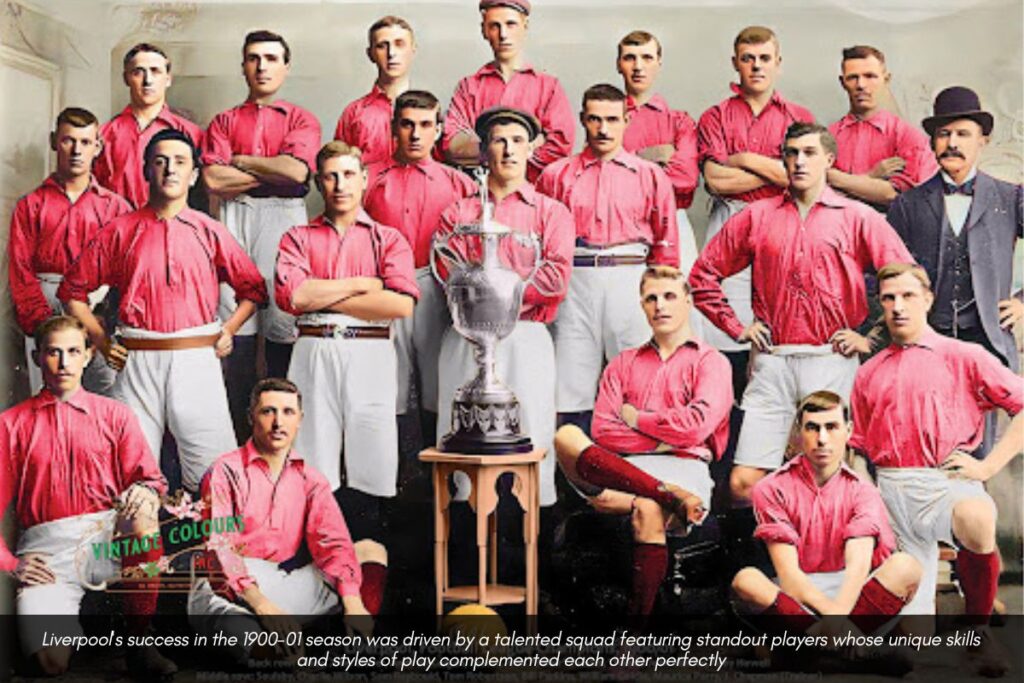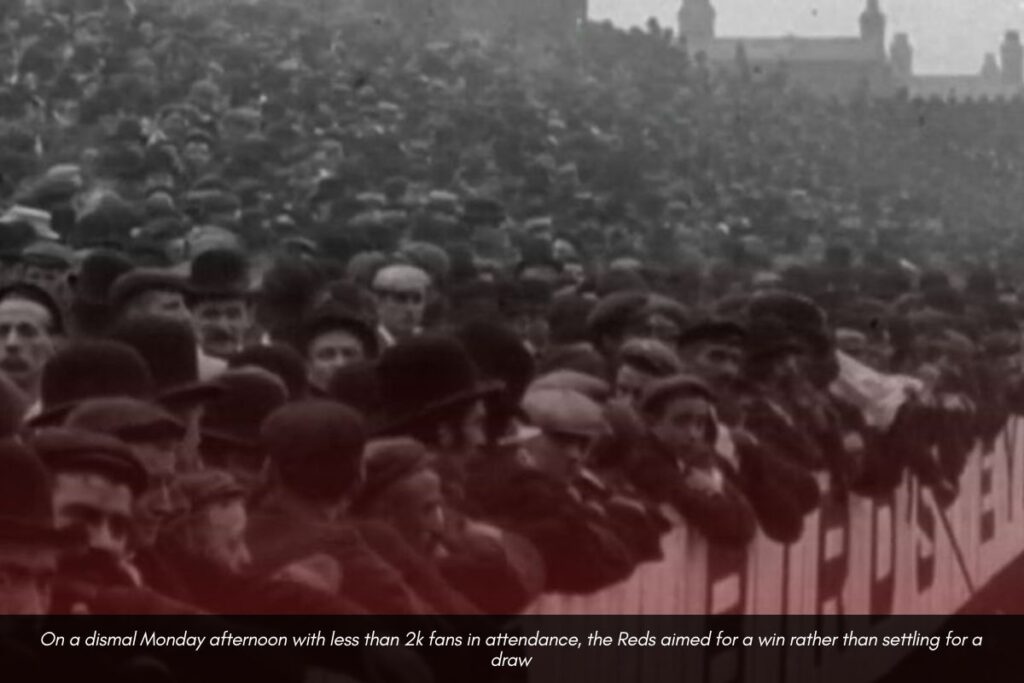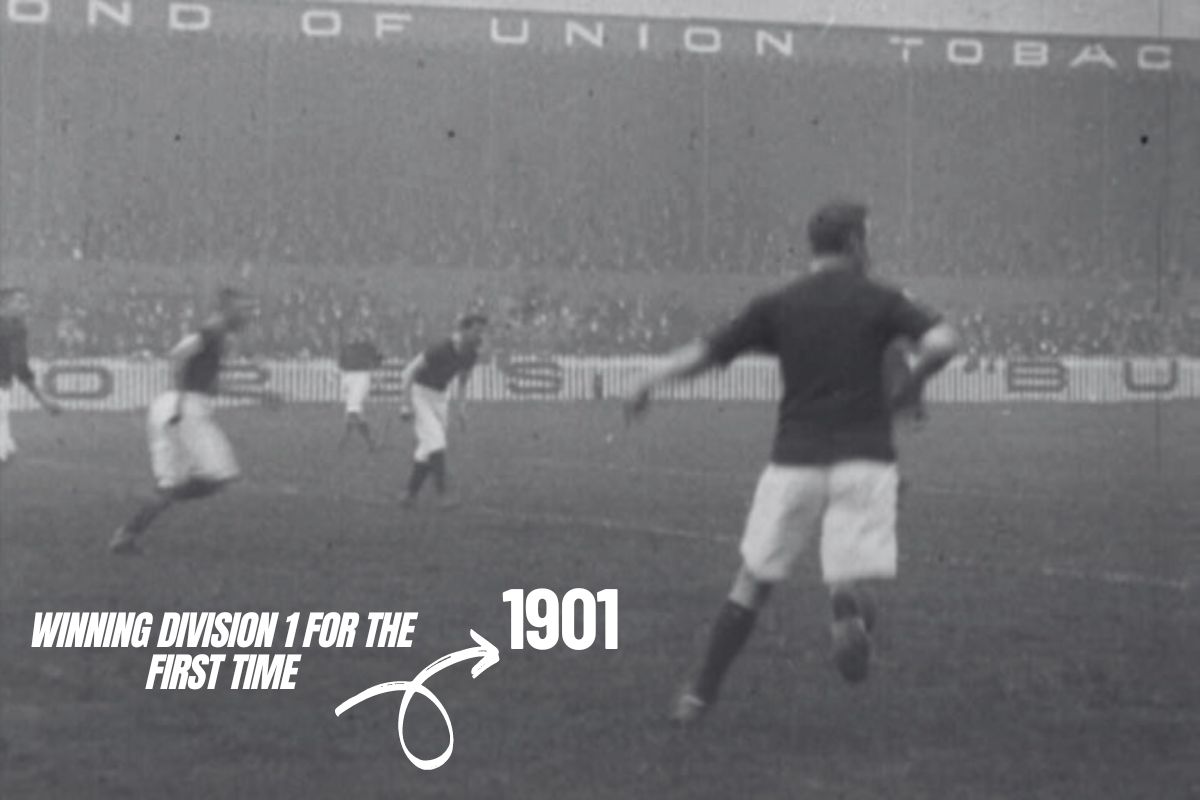After covering Liverpool FC’s first season in Division 1, today we shift gears to Liverpool Football Club’s triumph in the First Division in the 1900-01 season that marked a historic milestone for the club. Under the management of Tom Watson, Liverpool clinched their first league title, establishing themselves as a formidable force in English football. This victory laid the foundation for the club’s future successes and enduring legacy. In this article, we’ll delve into the key moments, standout players, and pivotal matches that defined Liverpool’s remarkable 1900-01 season.
Tom Watson, an Architect of Success
Tom Watson, appointed as Liverpool’s manager in 1896, played a pivotal role in the club’s maiden league title in the 1900-01 season. Known for his tactical acumen and strong leadership, Watson meticulously built a formidable team capable of competing at the highest level. His emphasis on disciplined defense and strategic play was evident throughout the season, enabling Liverpool to secure crucial victories. Watson’s ability to motivate and unify the squad was instrumental in maintaining high morale and focus, especially during challenging matches. His foresight in key player acquisitions, such as Sam Raybould and John Walker, bolstered the team’s attacking prowess and defensive resilience.
Under Watson’s guidance, Liverpool not only triumphed in the league but also laid the foundation for future successes, cementing his legacy as one of the club’s most influential figures. His impact extended beyond tactics, fostering a winning mentality that would define Liverpool for years to come.
Key Players of the 1900-01 Season
Liverpool’s success in the 1900-01 season was driven by a talented squad featuring standout players whose unique skills and styles of play complemented each other perfectly. Sam Raybould, the team’s prolific forward, was known for his clinical finishing and relentless work rate, making him a constant threat in the opposition’s penalty area. John Walker, another key attacker, displayed exceptional ball control and an ability to create scoring opportunities, often turning matches in Liverpool’s favor with his decisive contributions.

Defensively, the team was anchored by the steadfast duo of Alex Raisbeck and Billy Dunlop. Raisbeck, the team captain, was renowned for his leadership, aerial prowess, and robust tackling, which provided a solid foundation at the back. Dunlop’s consistency and tactical intelligence on the left side ensured stability and thwarted numerous opposition attacks. Together, these players formed a cohesive unit that executed Tom Watson’s strategic vision, leading Liverpool to their first-ever league title.
What was Liverpool’s 1900-01 Season?
The 1900–01 Liverpool F.C. season was the club’s 9th in existence and their 8th in the Football League since being founded in 1892. This season marked a historic milestone as Liverpool finished 1st in the league, claiming their first-ever Football League Championship by winning 19 matches. Despite their league success, Liverpool faced disappointment in the FA Cup, getting knocked out in the first round with a 0-2 loss to Notts County.
Liverpool’s journey to their maiden league title was dramatic. Remarkably, they topped the First Division standings on only two occasions throughout the season: following an opening-day win over Blackburn Rovers and a decisive final-day victory against West Bromwich Albion. Key players contributed significantly to this historic achievement. Captain Alex Raisbeck was a standout figure, known for his leadership and commanding presence in defense. His robust tackling and ability to read the game were crucial to Liverpool’s success. Forward Sam Raybould was another star, finishing as the team’s top scorer with his clinical finishing and sharp attacking instincts.
The combination of Raisbeck’s defensive solidity and Raybould’s goal-scoring prowess, alongside a well-balanced team effort, ensured Liverpool’s place at the pinnacle of English football for the first time. This season laid the foundation for the club’s future successes and established them as a formidable force in English football.
Returning to Liverpool by Train
The pivotal match ended with Liverpool securing a crucial victory against West Bromwich Albion. On a dismal Monday afternoon with less than 2k fans in attendance, the Reds aimed for a win rather than settling for a draw. Midway through the first half, Sam Raybould’s shot was parried by Albion keeper Joe Reader, allowing John Walker to smash the ball into the net. Despite Albion’s second-half bombardment, Liverpool’s resolute defense held firm, securing their win and the league title.

Following the game, the jubilant Liverpool squad was presented with the championship trophy. They then boarded a train back to Liverpool, where they were greeted by thousands of ecstatic fans at Central Station. A band played “The Conquering Hero” as the players were carried shoulder high in celebration, although the larger-than-life manager Tom Watson remained firmly on the ground. With the league title in hand, Liverpool began preparations for their next game, ready to build on their historic success and continue their dominance in English football.
Reflection on the Historic Achievements
Liverpool’s maiden league title in the 1900-01 season was more than just a milestone; it was a defining moment that set the tone for the club’s illustrious future. This victory represented the culmination of years of hard work, strategic planning, and remarkable teamwork. Under the astute management of Tom Watson, Liverpool transformed from a competitive side into the best team in the country, overcoming numerous challenges along the way.
This historic 1900-01 season win not only brought joy to the fans but also established Liverpool as a powerhouse in English football. The scenes of celebration, with thousands of supporters welcoming the team back to Liverpool, highlighted the deep connection between the club and its fans. The success of the 1900-01 season laid a strong foundation for future triumphs, embedding a winning mentality that would become synonymous with Liverpool Football Club for generations to come.
When comparing this early triumph to the iconic eras under Bill Shankly and Jürgen Klopp, striking parallels emerge. Shankly’s revolution in the 1960s resurrected Liverpool from the depths of the Second Division to league champions, instilling a philosophy of relentless work ethic and unity. His emphasis on teamwork and his ability to motivate players mirrored Watson’s approach in 1901.
Similarly, Jürgen Klopp’s recent era has been defined by his charismatic leadership and “heavy metal” football, bringing Liverpool back to the pinnacle of English and European football. Klopp’s tenure has seen the club win the Premier League after a 30-year wait, with a style that combines tactical prowess and high-intensity play, reminiscent of the foundational values established in the 1900-01 season. Each era—Watson’s, Shankly’s, and Klopp’s—has built upon the legacy of the past, forging a continuous line of success and innovation. The 1900-01 season was the first chapter in a story of resilience, adaptation, and triumph that continues to define Liverpool Football Club.
Conclusion
Liverpool’s Division One was a historic breakthrough, marking the club’s first league title and setting a precedent for future success. This triumph under Tom Watson laid the groundwork for the legendary eras of Bill Shankly and Jürgen Klopp. Each era, though distinct in style and challenges, embodied the same spirit of resilience, teamwork, and unwavering ambition. From Watson’s foundational victory to Shankly’s revival and Klopp’s modern-day dominance, Liverpool’s rich history of overcoming obstacles and achieving greatness continues to inspire and define the club’s legacy. The 1900-01 season remains a cornerstone of Liverpool’s enduring success.
Read all other posts on the 1900-01 season
Stay tuned for more updates on Liverpool FC Times and Stories. Your thoughts are always welcome in the comments section. Thank you for your continued support!
YNWA (You’ll Never Walk Alone)!
The Liverpool FC Times Team
LiverpoolFCTimes.com
